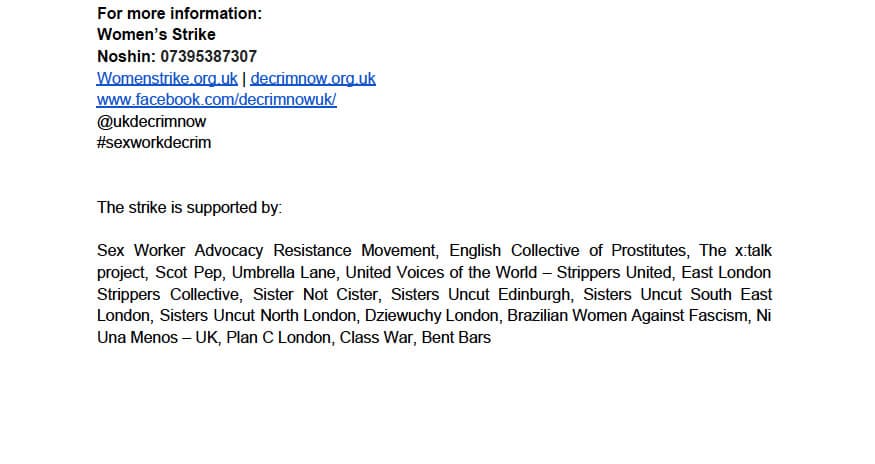
(IWD 2019) In conversation with… A Sex Worker
In conversation with:
Mystery Guest who shall not be named for reasons of stigma who is a member of the Sex Work community

As our programme for International Women’s Day (IWD) on Threads Editorial relates to representation, conversation and sharing of ideas. I felt it was important to speak to as many people as possible. I am privileged to have friends from all walks of life and this makes for diverse and interesting conversations over a cup of tea. I met up with our Mystery Guest (who I will now refer to as MG) for a conversation regarding our IWD programme. MG has been in sex work for a number of years and we talked in great depth primarily as to how sex work functions within law. This is because on IWD itself there is a sex worker strike to demand the full decriminalisation and better working conditions.
Why is this important? Well think about it, regardless of what you may think of sex work (probably based on the binary narrative tropes of ‘precarious, vulnerable, drug using street worker’ or ‘Belle du jour’), it is an industry like any other. Not all are as the previously stated characters, which really relates to the autonomy of a woman’s body. The conversation is dominated by (as MG put it) SWERFs -sex worker exclusionary radical feminists who alongside TERFs – trans exclusionary radical feminists represent a corner of feminism that, really is not at all feminism. MG expressed that because of these voices she began to feel entirely excluded in the feminist dialogue and felt tempted to stop calling herself a feminist and start some new movement instead. However the best plan is a path of engagement as while we are never far from the outraged echo chamber of social media, the nuanced voices resonate for much longer than somebody screaming in your ear. It also removes anyone who is not a SWERF or TERF from the discussion about safeguarding the needs of sex workers. This in part due to the belief that all workers are victims and therefore their opinions do not count or are lesser: because they are victims. But victims of what? Their own decisions? Aren’t we all victims of that? I also have to agree, SWERFs & TERFs only seem to be gaining so much airtime on social platforms because they are shouting the loudest. I was never really one of unnuanced debate either. However the problem with this predominant view of workers as victims is actually causing the legal framework to dismantle safeguarding mechanisms that keep workers safe. Shouldn’t people who are in control of their own minds, bodies and lives be allowed to work in a consensual environment free from worry, anxiety and overall fear that something bad may happen? Just like anyone in ANY OTHER JOB? I believe so. I also wanted to have this discussion with MG because I, like many other people really do not know a thing about Sex Work. That is absolutely fine, however what is not absolutely fine is not taking the opportunity to educate myself and learn about the industry from an objective point of view that also allows the more nuanced, rational voices to be heard. This is both the hope of myself and MG in working on this piece.
MG suggested that a good place to start is how to manage sex work within law to highlight the need for decriminalisation.
First is the full criminalisation model – this is where it is totally illegal, both client and worker can be prosecuted. There has been noted cases of women who carry condoms in their bag being arrested and prosecuted by the police. Also if people are prosecuted and receive large fines, they are sent further into the work to pay their legal bills. This model makes it very difficult for people to get out. In short full criminalisation is bad for all parties concerned. At this point in time sex work is fully criminalised in America.
Next is the ‘Nordic/Swedish’ model. This is being pushed by SWERFs and their (as MG puts it) “morally panicked version of feminism” and this version criminalises the client. It has been introduced in France, Ireland and they are trying to push it here. Because it is being advocated by SWERFs it gives the distorted view that all sex workers are victims and exploited, which as mentioned before leaves them out of the conversation therefore under represented.
Then we have partial-criminalisation/legalisation which means ‘technically’ sex work is legal but can only happen in certain ways. It creates a two-tiered system like we see in Amsterdam. We have this view that the red light district is part of the experience in Amsterdam and while it is the case that the only way to work there is in a ‘window’ (all workers are essentially on display to passers-by), it is very difficult to obtain a license because you need to actually own the window. The problem here is that those who own the licenses will not part with them so they are leased, while this is happening the government is also trying to reduce the number available so people are again pushed out to the fringes which means they are then conducting criminal activity by working. Money drives the system (as it does many things) as is the case with the ‘Mega Brothels’ in Germany also making it harder for individuals to work. In this framework it is also illegal to do ‘brothel keeping’ which is where two or more workers are in the same building.

Consider this: a worker has a bad experience with a client and decides to work in the same building as another worker for safety reasons, one or the other could be charged for pimping. There has been cases where one worker was assaulted and the other goes in to assist and asks the client to leave however the client turned around stating they are running a brothel so they are unable to call the police. The safety and security of the worker is put in jeopardy. MG cited another example that if they decided to work at home and they had a flatmate or their partner living with them, they could also be classed as a pimp. If the housemate/partner leant MG £20 say for groceries this could be classed as lending money for immoral earnings. So in this model having a sexual act with someone for money is legal yet all of the mechanisms of protection that surround it are illegal. At this time sex work falls under partial legalisation in the UK.
Finally full decriminalisation: this exists in New Zealand which is a good place for workers. MG has practiced there and said that by being decriminalised it is taken out of the realm of being managed by law and becomes a job like any other. Meaning the workers have rights like any other worker. NZ has decriminalised all forms of work and the only condition is that if the client takes off their condom they can get prosecuted. A personal reason for MG relating to decriminalisation is that her experience working in a brothel undertaking full service work with clients seeing up to ten clients a day. The establishment was run by “an absolute witch of a woman” who was abusive towards the workers and would fine them for things such as the bed breaking, which as MG pointed out that such a thing happening in a brothel is par for the course. MG was also sacked without notice so it was a complete disregard of any kinds of rights for her in the workplace. If there was decriminalisation here then these experiences with individuals such as the aforementioned proprietor could be dealt with within a legal framework offering workers more protection.
MG summed up the need for decriminalisation relating to workers having rights as actual human beings and being one step closer to not living in fear of the consequences regarding “us doing what we do”. The problem is with SWERFs and their continual approach to base their argument on trafficking which is a totally different story. Most human trafficking is in domestic labour and farming yet no one is trying to criminalise those acts. No sex worker condones trafficking and the only way to stop it is to decriminalise it.
In America the Fight online sex trafficking act (Fosta) and Stop enabling sex trafficking act (Sesta) were intended to help yet may be doing more harm than good. These acts prosecute those who host advertising sites which means since Fosta/Sesta any sites, forums, bad client lists are gone and those who were working on the streets to advertising online have been pushed back onto the streets. It has once again made sex work more precarious and pushed people further into the hands of the traffickers. It is also an extension of the patriarchy’s goal to remove the autonomy of a woman’s body and continues with their time honoured tradition of getting women to police women. Also when some of these sites were closed down it removed the paper trail for police investigations relating to trafficking.
One thing MG stressed relating to trafficking was that it is seldom ever what we know it to be from representation in film, tv or books. It more often than not starts close to home usually instigated by a partner through coercion, manipulation and subtle acts that steadily allow someone to fall into exploitation. This forms a very small percentage of sex workers but is no ‘less’ of an issue. It is a separate issue that is being used as a justification to erode the safety mechanisms that surround workers. There are rigorous processes of checking that MG described as part of their process regarding accepting and working with clients. Granted someone working on the street would not have such a luxury but equally those who are not, rely on these safeguarding protocols to keep them safe while working.
There is a difficulty when things become a moral crusade in that we find ourselves in a climate of sensationalised ideas and the loudest voices may not make the most sense. It also furthers division within feminism and kicks dirt over the key issue which is not to do with sex workers but more to do with women in poverty. It is important to recognise that all of these issues existing within feminism can only be fixed by working together not furthering the division. Marginalised humans tend to get scooped up by sex work and anyone who cares about these issues should support or at least educate themselves to understand the case for decriminalisation. I asked MG what she felt excited for regarding IWD from a sex worker’s perspective and she expressed that it feels like workers are being given space within the feminist movement as a whole for which a time she felt excluded.
Author:
Al Ballentyne is head of editorial at Threads Radio and a freelancer working in entertainment, broadcasting and education. He performs regularly a ‘Barry Bungalow’, a surrealist cabaret entertainer & storyteller. He co-runs ‘Canned Aid’ – a social initiative aimed at taking direct action against food poverty. He works as ‘The Guerrilla Mystic’ which is a project aimed at demystifying spiritualist ideas and practice so more people can access and benefit from connecting with the energetic flow of the universe. He hosts ‘Barry Bungalow’s Extreme Fetish Club’ & ‘The Guerrilla Mystic’ shows on Threads. Al works as a guitar-for-hire, general disco menace and moonlights as a lecturer/educational consultant. You can connect with him on
Twitter: @alballentyne
Instagram: @alballentyne
The following is the press release for ‘Sex work strike 2019’


Back to home.